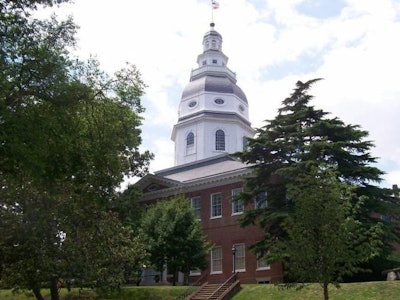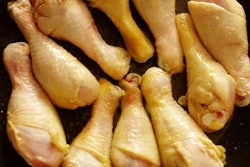
A proposed law in Maryland looks to shift the responsibility for excess poultry manure to the integrator rather than the grower.
Both houses of Maryland’s General Assembly are considering a bill called the Poultry Litter Management Act. Its supporters say it will make integrators, who own the birds and the feed, responsible for cleaning up after their birds and keep pollutants out of the Chesapeake Bay.
Bill Satterfield, executive director for Delmarva Poultry Industry Inc., a trade group that represents broiler growers in the Delmarva Peninsula said the bill is just another step in the environmental groups’ mission to drive the chicken industry – which produced $989.9 million worth of meat in 2014, according to the trade group – off Maryland’ eastern shore.
“We think the bill totally is unnecessary,” Satterfield said in an interview. “We don’t see anything in the bill that does one iota of environmental improvement. It simply transfers ownership of some of the chicken manure to the chicken companies.”
The bill – sponsored by Del. Clarence Lam, D-Baltimore and Howard Counties, and Sen. Richard Madaleno, D-Montgomery County, – would regulate the way poultry litter is handled, transferred and used as a fertilizer as well as “requiring an integrator to be responsible for the removal and delivery of all excess manure.” The act, which is headed for its first hearings in Annapolis next week, looks to build on environmental regulations set up by the state’s Phosphorous Management Tool (PMT).
The PMT, which went into effect in June 2015, is a Maryland Department of Agriculture (MDA) program for monitoring the amount of phosphorous found in soil in farmland around the state. It aims to reduce the amount of phosphorous runoff generated from phosphoric fertilizers, like chicken manure, and has halted the application of phosphates on land oversaturated with the element. Environmental groups say an excess of phosphorous in the bay is leading to poor health of the estuary’s ecosystem.
In an interview, Alison Prost, Maryland executive director for the Chesapeake Bay Foundation, said the bill will help ensure the rules set by the PMT are followed. It will also ease the burden on taxpayers and contract growers for moving and finding an alternative use for the 228,000 tons of excess manure the MDA estimates the poultry industry generates on an annual basis. The nonprofit advocacy group estimates the bill would save the state millions annually in the cost of transferring excess manure.
“We didn’t put this bill in to undo or make those regulations any harder. We don’t want to argue again over how the tool is supposed to work,” Prost said. “This really is about us saying that the largest poultry companies need to foot more of the bill and more of the responsibility for any of the excess.”
The largest integrator operating in Maryland and the fourth largest broiler producer in the U.S., Perdue Farms Inc., is opposed to the bill and will fight to keep it from becoming law. In an interview, Steve Levitsky, the Salisbury, Maryland, company’s vice president of sustainability, said the company does not think the bill is the best path forward, because the PMT still has years to go before it can definitively assess the amount of phosphates in the Old Line State’s soil.
“We do not think it’s the best path forward,” Levitsky said. “It’s premature to move ahead with another piece of legislation before we really understand the problem and how best to address it,” Levitsky said. “Let PMT work its way through … and then from there come up with a plan on how to move forward.”
Levitsky said the PMT is about halfway through its soil research. Without a complete assessment, the state cannot accurately assesses what exactly constitutes excess litter. The bill, he said, would also inject the state into transferring ownership of litter, make the process unnecessarily complicated and restrict farmers’ ability to generate revenue off of manure.
Perdue, he said, is already doing what the proposed legislation asks for, too. Levitsky said the company will take on litter and clean out chicken houses for free for any contract grower, for any company, who requests its services. Perdue has also run a program to turn poultry litter into pelleted fertilizer for more than 15 years, Perdue AgriRecycle L.L.C., and is looking to expand its recycling operations to include composting as well, he said. The AgriRecycle facility in Seaford, Delaware, is processing between 40,000 to 50,000 tons annually.
Levitsky agreed with Satterfield’s assessment that the act would make it harder to raise chickens on Maryland’s eastern shore. Perdue alone has $1.2 billion worth of assets in the area. Satterfield argued the bill will set a broader precedent in the state that a large corporation with franchise operations will need to be financially responsible for the waste products of its franchisees.
Maryland’s legislative session lasts for only 90 days, so supporters of the bill will have until early April to move the bill along. They will face key committee hearings on February 23 and 24. Prost declined to say whether she thinks the bill can pass. She’s confident that the bill will ignite a discussion on how to best implement the PMT.
Satterfield said his organization is taking the bill very seriously. Urban representatives outnumber rural ones in Annapolis and most people in Maryland, he said, are probably apathetic about the issue. He said it will be his group’s job to organize people opposed to the bill and educate lawmakers on the potential effects of the act.


















